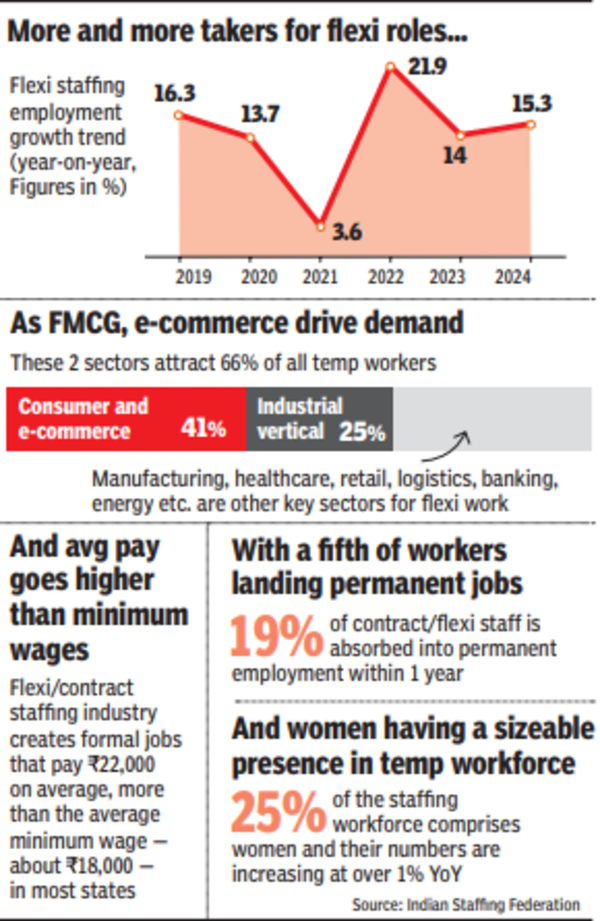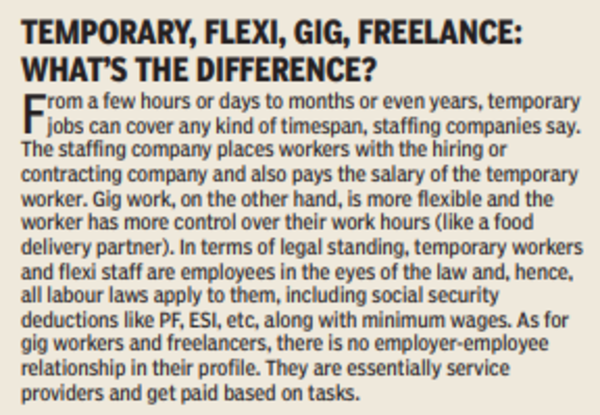[ad_1]
Rising tide of temp jobs research
Research by the World Employment Confederation and Worldwide Labour Organisation (ILO) paint a transparent image: non permanent work is on the rise globally.India isn’t any exception. Studies from TeamLease, a number one staffing agency, point out a compounded annual development charge (CAGR) of 16.3% within the non permanent staffing marketplace for 2022. Consultants predict this development to proceed, with the non permanent workforce probably doubling by 2030 to the touch a staggering 10 million. This factors to a major shift from the current, paving the best way for a extra transient job market.
Expert execs take centre stage gone
Gone are the times of non permanent work being synonymous with fundamental, repetitive duties. A report by international staffing corporations highlights a vital development — non permanent jobs are climbing up the worth chain. Firms are more and more in search of extremely expert professionals for projectbased work, peak seasons, or specialised experience. This shift is pushed by components like globalisation, technological developments, and the necessity for agility. This presents a singular alternative for expert professionals.
Non permanent work can supply:
- Venture-based challenges: Escape the monotony of a routine job and deal with thrilling new initiatives.
- Upskilling alternatives: Publicity to new applied sciences and {industry} developments, enhancing skilled improvement.
- Flexibility: Handle worklife stability with higher management over schedules.
The blurring traces of tenure
Whereas reviews by ILO acknowledge the rise of non permanent work, in addition they warning towards job insecurity. However the actuality is that conventional job safety — with outlined profession paths and lengthy tenures — is changing into much less prevalent and, as a matter of truth, it impedes the flexibility to maximise dignified earnings within the dynamic world we reside in immediately. Firms are more and more adopting a projectbased strategy, requiring a extra adaptable workforce. This doesn’t negate the necessity for job safety, however quite redefines it. The long run lies in moveable abilities, adaptability, and a strong social safety system that helps non permanent staff.

Gig work: A rising urge for food
The rise of the gig economic system, fuelled by digital platforms, additional underscores the rising acceptance of non permanent work preparations. Organisations are exhibiting a higher urge for food for gig staff, significantly for duties like advertising and marketing, content material creation, and information evaluation. This development is predicted to surge — a Nasscom-Aon report predicts a 78% improve in India’s gig workforce by 2025 to achieve an estimated 25 million gig staff.
This interprets into a good portion of the workforce embracing the flexibleness and project-based nature of gig work. Whereas earnings variability exists, a report by Aspire Circle (a number one gig work platform) signifies a median earnings of Rs 25,000 monthly for expert gig staff in India. The determine can fluctuate relying on the precise ability, expertise stage, and platform used. Nonetheless, it highlights the potential for gig work to offer a aggressive earnings stream for expert people.

Investing in abilities is vital
To actually harness the potential of non permanent work, a give attention to ability improvement is paramount. Studies by TeamLease emphasise the necessity for investments in creating industryspecific ability units throughout all ranges. Apprenticeship programmes, as championed by the federal government, can act as a significant gateway to employment, equipping people with the mandatory abilities to thrive within the non permanent job market.
Embracing the long run
The way forward for work in India extends past simply non permanent jobs. It’s a paradigm shift in the direction of a extra agile and adaptable workforce. McKinsey’s distant work research reveals that a good portion of duties might be executed remotely, probably impacting expertise swimming pools for non permanent roles. The World Financial Discussion board’s “Reskilling Revolution” emphasises the necessity to equip staff with in-demand abilities like advanced problem-solving and creativity. Equally, reviews by PwC and EY spotlight the rising demand for specialised abilities in non permanent positions.
Getting ready for transience
This dynamic panorama calls for a multi-pronged strategy. We want strong investments in ability improvement programmes tailor-made to the evolving wants of the non permanent job market. Apprenticeship initiatives and industry-specific skilling efforts should be prioritised. Moreover, social safety measures must be adopted to offer a security internet for non permanent staff.
By embracing this future of labor, India can unlock a wave of alternative. It’s time to maneuver past conventional fashions and empower a talented, adaptable workforce able to thrive within the transient job market. Let’s equip India for the long run, immediately.
As Milton Friedman, the Nobel laureate economist, aptly acknowledged, “The secret is to be expert and adaptable. The long run belongs to those that imagine in the fantastic thing about their desires.” By prioritising skilling and embracing adaptability, India can guarantee its workforce is not only ready for the transient future, however actively shaping it. The author is co-founder, TeamLease, and an impartial board director.
The author is co-founder, TeamLease, and an impartial board director
[ad_2]
This Publish could comprise copywrite


